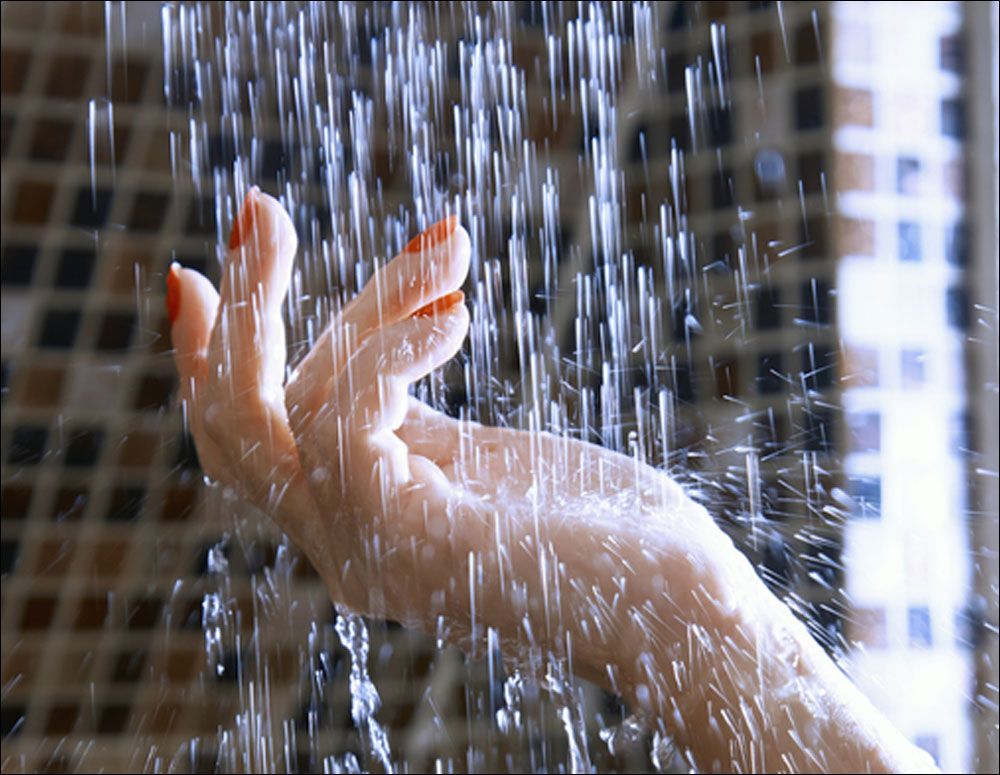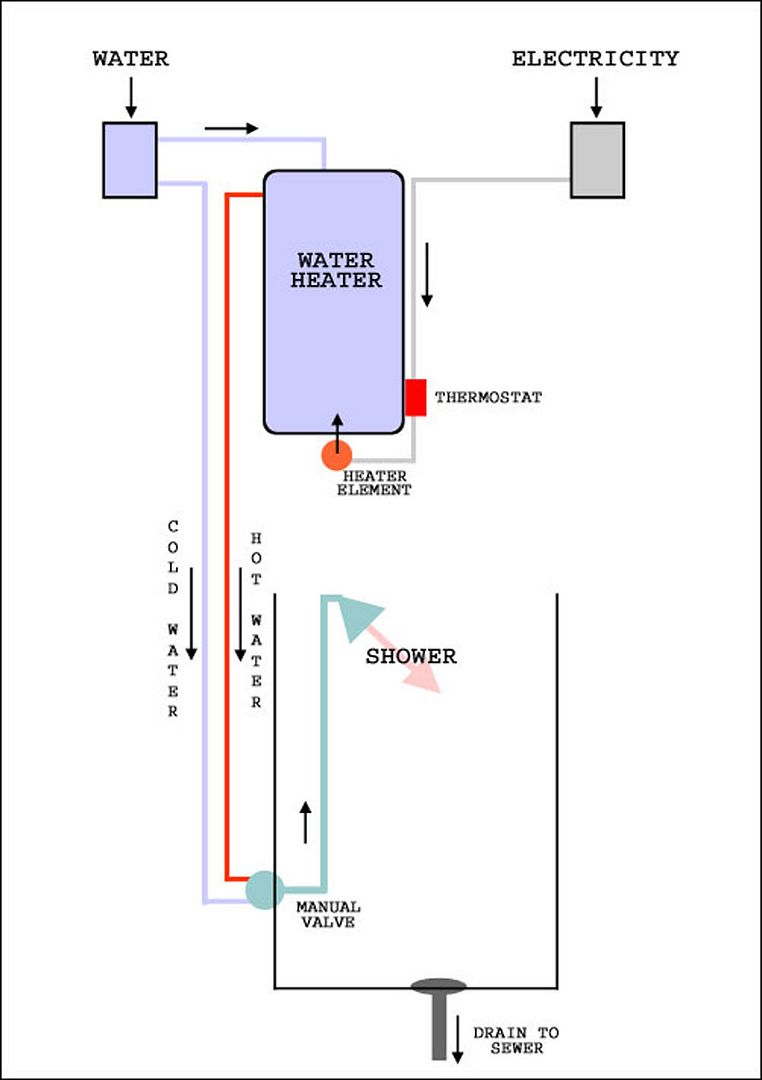An Introduction to "Thinking In Systems" - Part One

Over the next month and a half we will be discussing one of the most important parts of your training in Green Wizardry, the ability to "Think In Systems". It is a way of looking at the World that so few people have anymore. If more did, we wouldn't have the troubles and problems we have. Or we would have less of them. Troubles will always be with us, but how we approach them, makes them either Problems to be solved or Predicaments to be lived with.
I would expect that everyone reading this is familiar with this most basic of household furnishings, the Bathroom Shower. Some are opulent temples of the act of washing, decked in marble and chrome, while others are just a simple hose nozzle over a tree limb at a county cabin. From either extreme, it is one of those technical innovations that no one remembers who invented it but we would hate to do without. A bath or shower is a good example of a "system".
Let us examine it in detail.
Start With Some Hot Water.
As everyone knows, somewhere in your home you have a water heater. For me its in my basement, for others its in a small closet or the garage. Cold water comes in from the municipal main or outside well. It has an average temperature of 50 degrees Fahrenheit (13 degrees Centigrade). Anyone who has had to put up with a broken water heater for a few days knows that a shower straight from the tap, is one cold and miserable experience.
Most water heaters will store between 60 and 80 gallons of water (230 to 300 liters). And the thing is, they store that water at a constant hot temperature too. Whether you take a shower at 9pm like I do, or at 8 am, your water heater faithfully keeps that huge mass of water hot, just in case you might jump up and want a shower.
Yes, I will note that a water heater provides hot water to your kitchen for cleaning dishes, still, anyone using 60 gallons to do those dishes?
Since an average shower uses 10-15 gallons of water, you would think that you would be set BUT as we all know, after 20 or so minutes the water starts getting colder, so you turn the cold water down bit by bit. That's because as water flows out of the water heater, fresh water flows in to keep pressure. This new cold water mixes with the remaining hot water, and chills it. While the heater element tries to keep the water hot, it usually can't keep up.
Now hot water straight from the water heater is usually way too hot to just use by itself, so you add colder water to the stream via manual valves in the shower until the temperature feels comfortable.
Since an average shower uses 10-15 gallons of water, you would think that you would be set BUT as we all know, after 20 or so minutes the water starts getting colder, so you turn the cold water down bit by bit. That's because as water flows out of the water heater, fresh water flows in to keep pressure. This new cold water mixes with the remaining hot water, and chills it. While the heater element tries to keep the water hot, it usually can't keep up. Hot water straight from the water heater is usually way too hot to just use by itself, so you add colder water to the stream via manual valves in the shower until the temperature feels comfortable.
We heat up water until its too hot, then add cold water to cool it down to the point we can use it. Does that seem a bit wasteful or is it just me?
Add to this, most home builders don't put the water heater near the bathroom. Mine is situated next to the furnace, both of which sit just under the staircase into my basement. This means there is about 20 feet (6 meters) of exposed copper pipe in my basements ceiling leading from the water heater to the shower. Like most of us, when you get ready for your shower, the first thing you do is turn on the hot water. Why? That is because the water that comes out first is cold. Turning on the water and letting it flow for a bit, has the effect of flushing the standing water in that pipe out, which has now cooled to room temperature, copper being an excellent conductor of heat, and replacing it with new hot water fresh from the tank. It usually take a minute or two before hot water is coming out at which point you can start adding cold water via the manual values to adjust the temperature and begin your shower.
So we heat up a gallon or so of water, and then let it sit in a series of metal pipes, as it radiates its heat into the atmosphere. Does that seem a bit wasteful or is it just me?
Also, go touch your water heater some time. If its like mine, its warm. That's more wasted energy just radiating outward. And that's just waste heat.
Another thing most people don't think about. All that water going down the drain. The majority of water coming from your shower head, if it hits you, immediately runs off you, still hot and steaming, to goes down your drain and out of the house. Think about that for a moment. Most of the World makes do with a gallon of water, maybe hot, to wash and clean themselves. We use the equivalent of 10 person's allotment with every shower.
I hope even fledgling Green Wizards can recognize what a huge waste of energy and of water this typical American shower system is. In an Age of Abundant Energy, wasting all of that energy and water makes sense. A twisted self centered sense. In the coming Age of Scarcity, not so much...
"Thinking In Systems"
Here is a diagram of a typical shower.

There are three types of things which affect the system and how it works. Greer names these; Energy, Matter and Information.
- Energy is the electricity (or natural gas) we use to heat the water.
- Matter is the water itself. We will ignore for now the actual things that go into building this system, and the costs associated with them, though we will later.
- Information is a little more complicated but can be summed up as, that which regulates Energy and Matter. In this case there are two, the first being the Thermostat attached to the water heater. This bit of mechanical control, regulated the way the heater element warms the water in the tank. If that water gets a little cool, it turns the heater on. When it reaches the right temperature, the thermostat turns it off. The second facet of Information, are the manual valves in the shower itself, that which you use to adjust the temperature of the water.
A system needs all three inputs working in harmony to arrive at the desired result, but working in harmony but not necessarily working optimally.
Its easy to see how you could maximize one of the three inputs to a simple system like a bathroom shower, and still get the result you wanted, that is a hot shower. You could set the thermostat at its highest, and have the water in the water heater almost scolding, and still using the Information input, via the manual values, give you a comfortable shower. You could also restrict the flow of water so that what came out of the shower head was a mere trickle. You could still get clean but it wouldn't be that much fun. You could even add complexity onto your Information input, using a temperature sensor to monitor the water coming from the shower head. Tie it to a big green and a big red bulb on the bathroom wall. Green is alight and water is in optimal temperature, red it has gone out. When we could just throw more energy at it, like the abundant energy of our fossil fuel deposits, and get the results you want, then a sloppy system was ok. As we enter a time when those fossil fuel reserves are harder and harder to get to and use, a sloppy system becomes a liability.
A Green Wizard must learn how to use the three inputs, Energy, Matter and Information in a efficient and useful way to optimize the system's performance.
We will look at how to do that, in our next post.
---
Video Homework
No jotting down examples this week, instead we have a video that I would like everyone to watch.
The movie "Mindwalk' from the 90s, is a stunning introduction to Systems Theory AND is one of my top three best movies of all times. The level of dialog and interaction between the three main characters will blow you away. It is available to view on Youtube, posted by its director (who I chatted with via email, expressing my thanks) so you can feel a bit better about watching a copy written film for free. If you are like me, and enjoy deep conversation, insightful commentary and just a fraking good movie, then take an hour and a half and watch.
---
"Hands of woman in shower" by ID 92965996 © Arman Zhenikeyev | Dreamstime.com
Comments
David Trammel
Thu, 10/04/2018 - 19:38
Permalink
Previously Posted
This post, and the follow up series was first posted to the old forum here:
"Introduction to "Thinking In Systems" - A GW Principle - Part 1"
The comments are worth checking out.
Alacrates
Sat, 01/19/2019 - 11:06
Permalink
Nice Post
Nice to see some entries on systems thinking, I didn't catch these on the old forum (the link to the old forum post & comments doesn't seem to be working at the moment.)
I think exercises like these are good, breaking down everyday things into systems thinking categories. I think its the only way to get this way of looking at things to really take root in one's habits of thought.
Thought exercises in general are interesting me more recently, I think they are a possible antidote one can take to break out of the polarization that has made its way in to our society, and also to sharpen up our own thinking to face the challenges that confront us. Not to mention a lot of independent thinkers scattered throughout society introduce a range of new possibilities into the general mental atmosphere of the times.
As to hot water tanks, I've wondered if heat loss really matters during the months that we heat our homes, is it not just adding to the indoor warmth so that our furnace/boiler turns on a little less frequently. I guess a hot water tank is sometimes an inefficient way to add heat to a home, especially if you have an electric tank, and your electricity comes from a plant that burns fossil fuels to make it - it would surely be better to burn the natural gas within your furnace than to have it burned many miles away, transporting the energy down power lines, in order to create heat once again with the elements within the hot water tank.
And, of course, in the summer months, if you are using air conditioning, then your hot water tank is certainly working against your purposes, heating up the area you're paying to cool down! I've heard that in Mexico the hot water tanks are often outdoors, and I've seen videos from the U.S. where the water tanks are in the garage - certainly would not work where I live!
Thanks for including the link for Mindwalk, I've never heard of it but I'll certainly check it out!